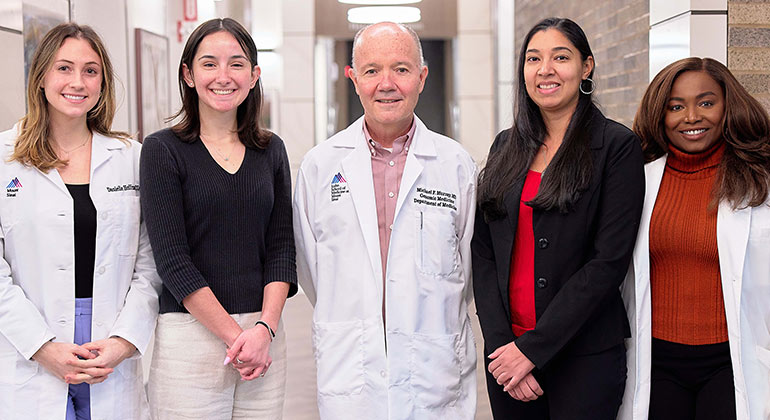Genomic Health Clinic
In the Division of Genomic Medicine, we strive to help people use their own genomic information to better understand their personal health risk. With this knowledge in hand, patients can seek the care they need to identify disease at an early stage, or to prevent it altogether. Our Genomic Health Clinic offers testing for genomic risk and one-on-one counseling.
What is the purpose of the Genomic Health Clinic?
Both genes and the environment affect our health. Genomic risk refers to the contribution of our genes to our chance of developing certain health conditions. Clinical testing can help to identify genomic risk. This information can empower people to take action to find and treat disease early when doing so may be more effective, or to prevent disease altogether.
Learn more about genetic testing
Traditionally, patients have been referred for genetic evaluation and testing only when they have symptoms or a strong family history of disease. But with genetic testing now widely accessible, more people than ever before may benefit from learning their genomic risk. Elective genetic testing—also called predictive, preventive, or proactive genetic testing—is when someone chooses to have genetic testing to predict the risk of disease, even without a strong personal or family history.
For example, three genetic conditions—hereditary breast and ovarian cancer, Lynch syndrome, and familial hypercholesterolemia—have been recognized as important for public health by the U.S. Centers for Disease Control and Prevention, because knowing about genomic risk can lead to better screening and prevention of disease. Recent studies show that 1 in 75 people may be at high genomic risk for one of these conditions, but most are unaware of this risk[1]. Hundreds of other genes are also known to play a role in health.
Genetic testing can help people find out if they are at higher risk for certain cancers, heart disease, and other health problems. Testing may be limited to a small number of genes, or may include the entire genome. Our genomics team will help you decide which testing options may be right for you, and how to use genomic risk information in your medical care.
Who should be referred?
Our team of genomic specialists are available to meet with any adult who:
-
has an interest in learning about genomic risk for disease
-
wants to discuss health-related results from previous genetic test results, including tests ordered by a doctor or independently from a direct-to-consumer company
-
has a family member with a positive genetic test result and wants to understand the implications for their own genomic health risk
-
is interested in how genetic information can guide personalized medication choices and improve treatment outcomes
What happens during an appointment?
Consultations typically consist of one to two visits, either in person or by telehealth. During the first visit you will meet with our genomics team, including a genetic counselor and a medical geneticist, to review your family and personal health history. You may also have a physical examination. Taking all of this information into account, the genomics team will talk with you about the options for genetic testing, including the potential benefits and limitations. If you choose to be tested, a blood or saliva sample will be sent to a clinical genetic testing laboratory outside Mount Sinai.
If testing is done, you will have a second visit where you will receive your test results and counseling about what they could mean for your health, including recommendations for next steps. Referrals to specialists and resources will be provided based on the test results and your personal and family history. Any recommended next steps for relatives will also be reviewed.
How should I prepare for my visit?
-
Talk with your relatives about their health. Knowing who in the family has been diagnosed with common and rare conditions helps our genomics team better evaluate your risk. And if anyone in the family has had genetic testing, a copy of their results will help us offer you the right test.
-
Gather previous genetic test reports pertaining to your visit (if any). Records from outside Mount Sinai can be sent in advance or brought to the visit.
-
Complete our family history questionnaire. After you contact us, we will send you a secure link to submit information about your family medical history. Alternatively, you can speak with our genetic counseling assistant to provide this information over the phone. Providing this information before the appointment will help our genomics team tailor the visit to your specific needs.
How much will this cost?
-
The clinical visit and genetic testing are separate services, and are billed separately.
-
Our providers are in-network with most insurance plans for the visit. As with any clinical visit, you would be responsible for any co-payment and unmet deductible specific to your plan. You should check with your insurance about specific coverage and whether a referral is needed to see a specialist.
-
The cost of genetic testing varies and depends on a number of factors. In some cases it may be partially or fully covered by insurance. Before any testing is ordered, we will discuss the different options and potential costs for testing with you.
-
How can I make an appointment?
Individuals wishing to schedule an appointment may contact us at 212-824-9600 or genomicmedicine@mssm.edu.
Genomic Clinic Team
When an appointment is scheduled, you will be seeing the Director of the Genomic Clinic, Michael Murray, MD; and our genetic counselor, Danielle Hoffmann, MS. When pharmacogenomic testing is ordered, Aniwaa Owusu-Obeng, PharmD, and team of pharmacists will join the visit.


